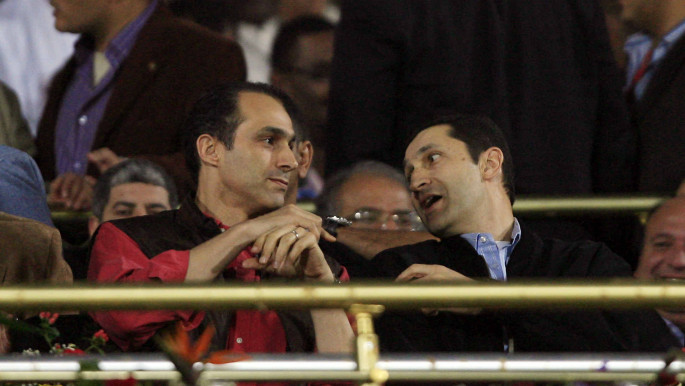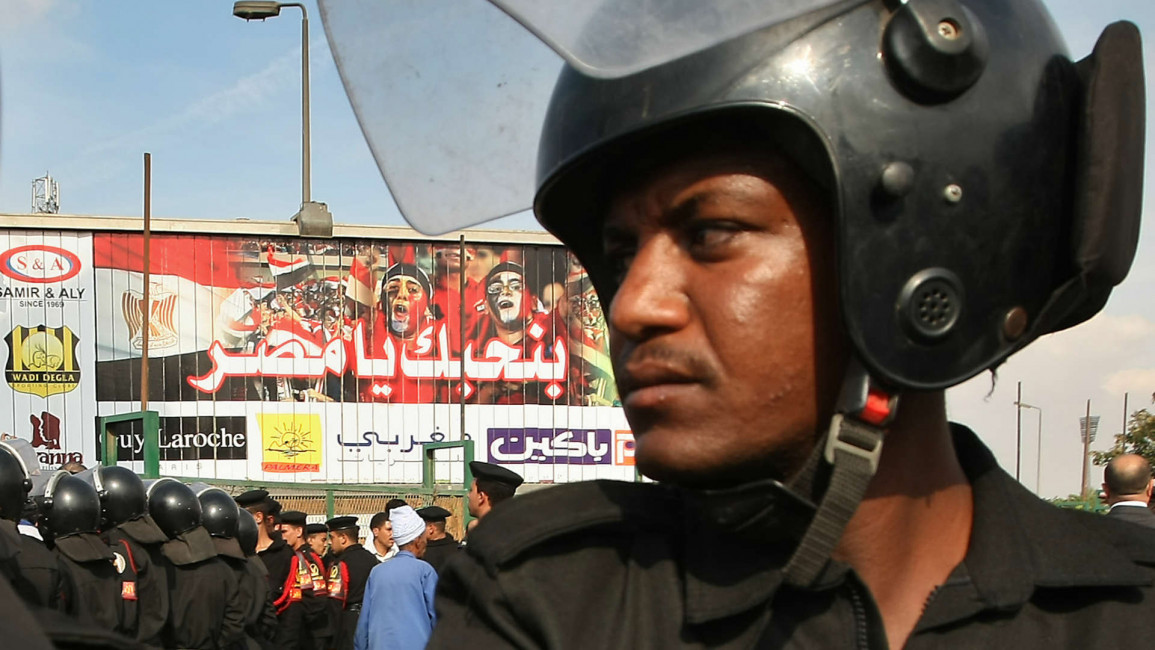
For the love of the game: Egypt's hidden political weapon
Last Sunday, Egyptian National Team and Liverpool FC forward, Mohamed Salah scored two goals against Congo securing Egypt a spot at the World Cup for the first time in 28 years.
Football is the only thing all Egyptians agree on. Regardless of their religion, gender, political affiliation or even socio-economic standing - the Egyptian National Team is holy.
It doesn't matter how politically aware you are, or how astute your analysis of the politicisation of the game is, if you are Egyptian, you are currently patriotic to the nth degree and your pride knows no bounds.
Football commentators thanked Salah, they thanked God and they thanked Sisi. The Egyptian president was not at the stadium in Alexandria, instead he was two hours drive away at his palace in Cairo.
But fans did not flinch at his absence or at the overt praise for someone who clearly had no hand in his team's success. Egyptians have become accustomed, if not indifferent to the political undertones imposed on the game they cherish.
From Nasser's pan-African creation of the Confederation of African Football, through Mubarak's football wars with Algeria, to the Port Said massacre and post-2011 crackdown on Ultras - football has long been a hidden weapon in the political arsenal of the Egyptian republic. Yet, as with almost all the PR tools mastered by his despotic predecessors, Sisi seems to squander football just the same.
 |
Sisi's poor charisma does not harm the regime's ability to play the game Mubarak had mastered decades earlier |  |
Sisi's poor charisma does not harm the regime's ability to play the game Mubarak had mastered decades earlier.
Shadowing the plays made by El-Neny and executed by Salah, the Egyptian government played the law - transferring all cases pertaining to the nation's protest laws to emergency tribunals, meaning that rulings in such cases are no longer subject to appeal.
The approved decree passed quietly as the many young people those laws affected danced in the square that once housed their revolution.
Blood of the martyrs
The uprising of 2011 saw the ascent of unlikely heroes – The Ultras. In a nation where political assembly was at best frowned upon, young men and women (mostly men) found comfort in the seemingly apolitical company of fellow supporters of football clubs. Despite the official line, members of the groups assumed a striking presence during Egypt's uprising.
The largest Ultras groups rallied behind the nation's largest football teams, Cairo based Ahly and Zamalek, nicknamed Ultras Ahlawy and Ultras White Knights respectively.
 |
Egyptians have become accustomed, if not indifferent, to the political undertones imposed on the game they cherish |  |
During the days in Tahrir, the youths of the Ultras defended their fellow protesters as the army stood by, watching, as Mubarak supporters stormed The Square on camel and horseback attacking and killing peaceful demonstrators.
As Mubarak stepped down, his Defence Minister took power at the head of the Supreme Council of Armed Forces - SCAF - of which now President Sisi was a member.
SCAF's tenure saw continued protests and subsequent Mubarak-style crackdowns on political dissent and the Ultras were not spared. The suppression culminated in the Port Said stadium massacre on 1 February 2012.
On the eve of the anniversary of the Ultras protecting Tahrir against Mubarak's camel riders, the police - believed to be still loyal to the former dictator - abandoned their security posts and checks. In the aftermath of the game between bitter rivals Ahly and Port Said-based Al Masry, 74 Ahly fans were killed and 500 injured.
 |
|
| Ultras march to the Ministry of Defence in Cairo on February 15, 2013 to demand the trial of former SCAF members [Getty] |
Yet, the massacre failed to push Ultras back into their apolitical bubble. They continued to at the heart of student protests taking strong stands against SCAF, Sisi and Morsi.
In June 2015, 46 people including nine police officers were convicted of the killings in Port Said. A month earlier, however, Ultras were banned, cementing the government's attitude towards opposition.
Opium of the masses
Egypt most famously climbed to FIFA's top 10 national teams after winning the African Cup of Nations for the third time running, the seventh time in its history in 2010.
The success of the national team rallies Egyptians around the only thing, many of them believe, makes them truly happy and proud to be Egyptian.
Read more: Ultras Ahly: The memory of a massacre in Egypt
Sitting in any Egyptian city, echoes of cheers when The Pharaohs play are never far off. During those 90 minutes, even the uninitiated cling dearly to the red and black flag, cheering for their country.
Even in Gaza, a puzzling display of something akin to collective Stockholm Syndrome descends on those Egypt has imprisoned for nearly a decade, in what many analysts refer to as "the world's largest open air prison".
Using what little electricity they have to project the Egyptian national team's football games on large screens, Gazans clutch their Egyptian flags and dance at their oppressors' good fortune.
 |
|
| Gamal and Alaa Mubarak attend World Cup 2010 qualifier [Getty] |
Football became Egypt's drug of choice - soothing political strife, calming sectarian discord and sedating brewing bread riots.
Mubarak mastered conjuring the football illusion. Unlike Nasser and Sadat, he did not have a war with Israel to rally patriotism. Creating an arch-nemesis in Algeria, Mubarak commenced the 1990s investing heavily in advertising the national team's upcoming battle with Algeria over qualification for the World Cup.
The state sponsored media storm was designed to distract from newly imposed sales taxes, alongside sweeping privatisation measures which left many unemployed. The manufactured crisis came to a head when a brawl broke out between the Egyptian and Algerian players on the pitch almost ending Egypt's World Cup aspirations.
The humiliating defeat suffered by the national team in Italy's 1990 World Cup saw the redirection of the team's effort towards winning less demanding tournaments, namely the African Cup of Nations.
 |
Football became Egypt's drug of choice - soothing political strife, calming sectarian discord and sedating brewing bread riots |  |
Mubarak's governments lent unparalleled support to the national football association and by the early 2000s the team delivered countless photo-ops for Mubarak.
As the pressure leading up to the 2011 uprising mounted, Mubarak reverted back to the empty nemesis which saved his economic devolution two decades earlier.
In 2009, Egypt and Algeria clashed once again but this time the violence spiralled. With Egyptian businesses set ablaze in Algiers and the Algerian embassy attacked in Cairo, the football war took centre stage in the media. Not only did it amplify push back on various economic, security and sectarian grievances, it also set the stage for Mubarak's sons Alaa and Gamal to emerge as heroes.
Not good enough
Despite Sunday's achievement, the Egyptian national team has been struggling in comparison to its standing under Mubarak. This is largely due to the two-year suspension of the country's Premier League in the aftermath of the Port Said massacre, which left President Sisi in a less than ideal position to make use of this fool-proof PR tool.
|
||
| Translation: I wish Egyptians stay happy and content except Abdel Fattah I want him to live a life of misery |
Post-uprising, Egypt repeatedly failed to qualify for the African Cup of Nations - a tournament it had once ruled. Finally requalifying in 2017, Sisi attempted to align his image with the one thing that made Egyptians happy, but the team lost the trophy to Cameroon.
The backlash of mockery over The Pharaohs' loss saw Egyptians blame Sisi for the team's misfortune, branding him bad luck.
This label was ever present on Sunday, with many Egyptians on social media excluding their president from the happiness and patriotism they felt - some going as far as advocating an uprising against him to make their happiness more complete.
Egyptians may have finally woken up from the football haze Mubarak had lured them into - I hope so - but it seems unlikely. The military regime will probably survive Sisi's overwhelming un-likability, while an Egyptian World Cup win seems like a less plausible prospect.
Gehad Quisay is a history and politics researcher, who graduated from SOAS and Georgetown University. She has also worked as a researcher at a London based think-tank focusing on post-Arab Spring nation building.
Follow her on Twitter: @ghqsy_
Opinions expressed in this article remain those of the author, and do not necessarily represent those of The New Arab, its editorial board or staff.




